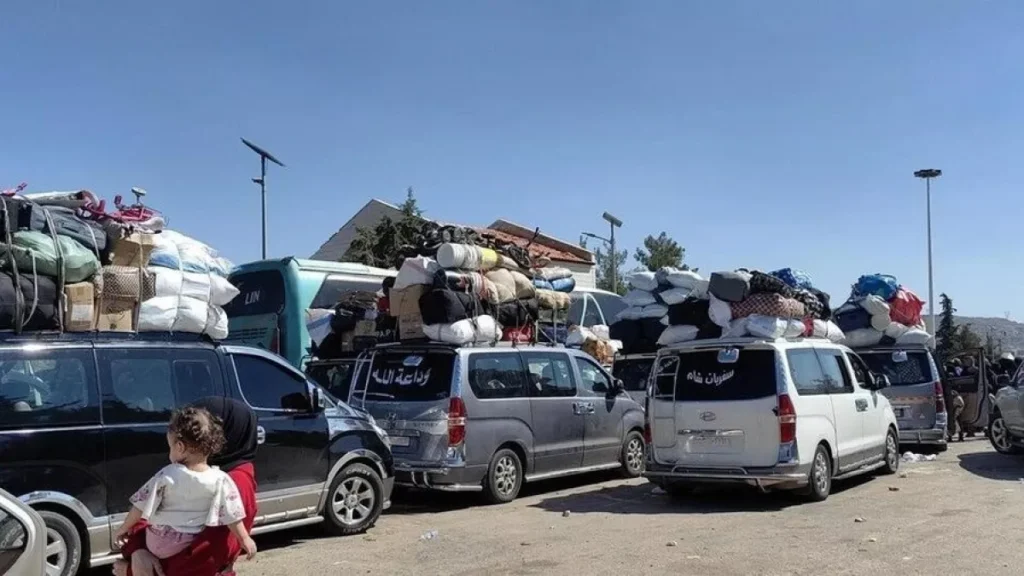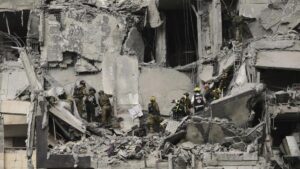At the Syria-Lebanon Border, Some Refugees Return Home While Others Flee, Fearing the Worst
Publisher December 12, 2024 0
Nadia crossed the border from Syria to Lebanon, her eyes filled with tears. She was about to reunite with her son, Mohammed, whom she had not seen since he left for Germany in 2013. At that time, he was just 14 years old. Now, as he is 22, Nadia was on her way to meet him in Germany after many years apart. The conflict in Syria had forced Mohammed to leave their home in Hasaka, located in the northern part of the country. Nadia, her husband Saiman, and their daughter Sydra had stayed behind, never imagining it would be so long before they saw him again.
After years of turmoil, Nadia and Saiman finally made it to Masnaa, a Lebanese border town, with a few suitcases in tow. They were headed to Beirut, where they would board a flight to Germany. The recent downfall of Syrian President Bashar al-Assad had triggered celebrations among many Syrians, and some, like Nadia, were returning to their homeland after years of exile. However, the sudden and swift takeover of the country by rebel forces, combined with Israeli airstrikes on Syrian government targets, has caused a sense of unease about the future of Syria.
At the Masnaa border crossing, a sense of confusion and nervousness filled the air. Vehicles honked loudly as they tried to maneuver through the massive traffic jam. Cars and vans, packed with people and their belongings, were lined up in a chaotic mess. Taxi drivers approached pedestrians, offering rides for exorbitant fees to Beirut or Damascus. Amid this chaos, Mohammed and his wife were among those heading back to Syria after years abroad. They had left Syria many years ago and were now returning with their children, born in Lebanon, to the country they had never seen.
Mohammed was overjoyed to return to Syria after 11 years. “It’s been a long time, and I just want to go home to my village. My brother is still there, and I haven’t seen him in over a decade,” he told a reporter. However, the excitement of going home quickly turned to frustration. While Mohammed and his wife had the necessary documentation to cross the border, their children, who were born in Lebanon, did not have the correct paperwork. This unexpected complication meant the family could not proceed as planned.
A stranger approached them, offering to help smuggle the family across the border for a large sum of money. Mohammed refused, unwilling to risk such an illegal move. For many Syrians who fled the country under difficult conditions, this lack of proper documentation has become a major barrier to returning home.
On the opposite side of the border, Diaa and his family were heading back to Lebanon. Diaa, a Lebanese national, had initially fled to Syria with his wife Amani and their three children. They had moved to Beirut before seeking refuge in Syria following intense Israeli bombing campaigns targeting Hezbollah. The assassination of Hezbollah leader Hassan Nasrallah had frightened their children, especially after they witnessed the devastation caused by the bombings. “My eldest daughter was unable to speak for an hour. The children were terrified, still haunted by the 2020 Beirut port explosion,” Diaa explained.
Now, after fleeing Syria once again due to ongoing strikes, Diaa and his family were crossing back into Lebanon. The family, burdened with heavy bags, struggled to make their way across the border to safety. The chaos at the crossing mirrored the broader uncertainty faced by many Syrians who are caught between returning home and fleeing the dangers of war.
Nadia, Mohammed, Diaa, and countless others find themselves trapped in an ongoing cycle of displacement, unsure of where to turn next. Some long to return to their homeland, while others are forced to flee yet again, seeking refuge from the ongoing violence. The border between Syria and Lebanon has become a symbol of this uncertainty, representing both the painful past and an uncertain future as families try to rebuild their lives amid the turmoil of war.







